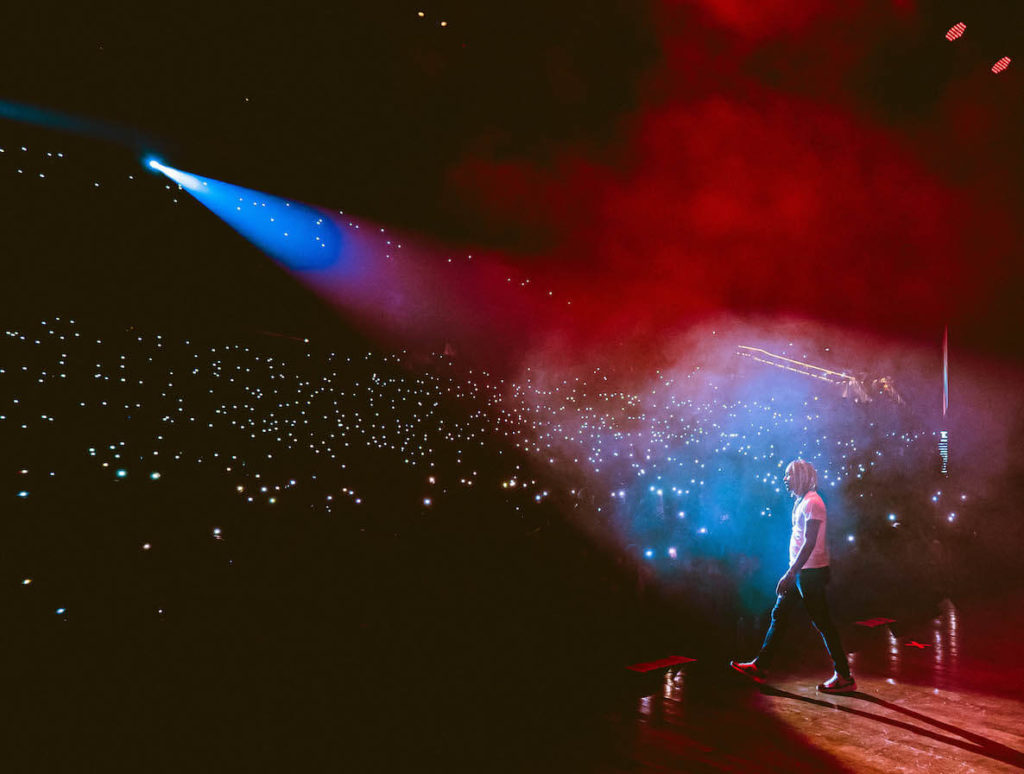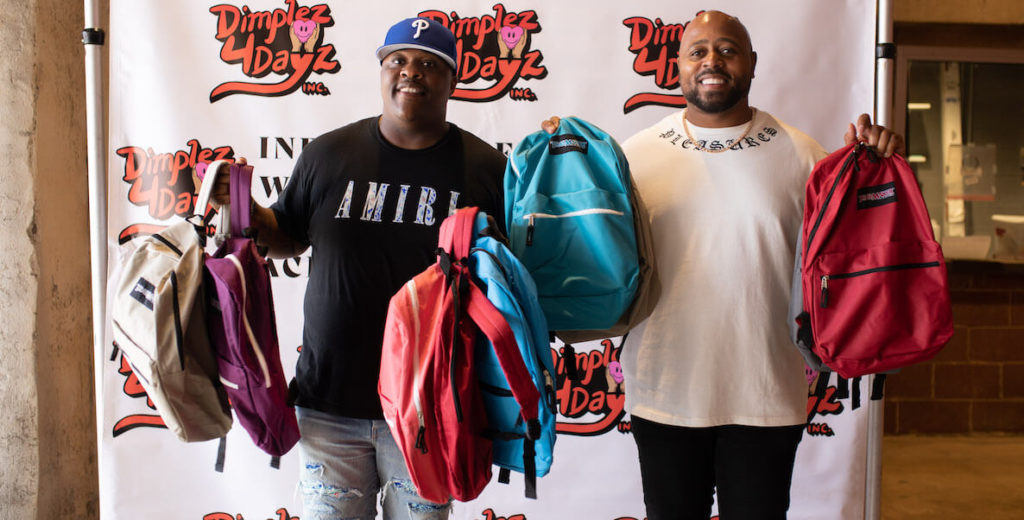On a sticky Friday last summer, about 9,000 fans gathered at the Mann Center to see popular Chicago rapper Lil Durk. As usual, the music blared and the mostly young crowd pulsed with the excitement of being in proximity to one of their favorite artists.
But unlike Lil Durk’s usual shows, this one had a theme: anti-violence.
It kicked off with motivational speakers Wallo267 and Pastor Carl Day talking about their pasts, how they made it their mission in life to spread positivity and give back to the community after they were released from prison. Next, before Lil Durk went on stage to perform, a video produced with the Office of Policy & Strategic Initiatives for Criminal Justice and Public Safety as a part of their #PhillyWeLostEnough campaign spoke specifically to the issue of gun violence in the city, its impact on local youth, and provided a list of resources and community leaders for conflict resolution.
“A lot of violence takes place after some of these nightlife spots and parties are going down,” says Pastor Day. “Yet none of the folks stepped up to say, ‘Hey, we want to contribute, give back, support, and bring out positive influential people to these shows.’ It’s unprecedented.”
And proceeds from the ticket sales were donated to two nonprofits: Culture Changing Christians Inc. run by Pastor Day which offers youth resources for relationship building, conflict resolution training, career and college coaching—and Dimplez 4 Dayz, which helps Philly youth find jobs and affordable housing.
All that unconventional programming was thanks to Dope Shows, a boutique-style concert promotional agency founded by Philly natives Stephen Piner and Jamir Shaw in 2017. They’ve thrown over 20 shows and one festival with an average sell-out rate of 90 percent—and a special focus on youth.

“Our slogan has always been ‘Ain’t no shows like Dope Shows,’” says Shaw. “We focus on creating a once-in-a-lifetime experience for our customers, curating the stages and shows directly for each artist by tapping into who they are. We also really care about what’s going on in the city, so we try to send out important messages geared towards that.”
The crowd at the Lil Durk concert was typical of the age range most Dope Shows appeal to—14 to 34 years old. And since lockdown, Piner and Shaw had been thinking hard about the need for anti-violence messaging in that community.
Which is why they brought in community leaders like Pastor Carl Day to send a positive message about never being too late to do the right thing and making change in your community by giving back.
“I was coming before thousands of people who may not have any interest and positivity right now because they want to hear Lil Durk,” says Pastor Day. “But they were receptive to it, and the crowd really showed a lot of love to me when they introduced me. I was blessed by it.”
Day is a big Dope Shows fan. “I really, really respect what they do,” says Pastor Day. “You’ve got party and club promoters who make a fortune every year and have no intention or conscience to actually give back to the city. A lot of violence takes place after some of these nightlife spots and parties are going down, yet none of the folks stepped up to say, ‘Hey, we want to contribute, give back, support, and bring out positive influential people to these shows.’ It’s unprecedented.”
The Lil Durk show, according to Piner and Shaw, was one of their most innovative to date.
“We had almost 9,000 people at the Mann Music Center and had zero incidents. And between being able to add the band element to Durk’s show and telling people to not be a bystander to the nonsense happening in the community and being someone that steps up—knowing that this could carry on even beyond the show—is one of our proudest moments,” says Shaw.
Making a “Dope Show”
Shaw, a graduate of Lock Haven University, began his career in education and was a dean at Mastery Charter Schools. Piner is a graduate of Kutztown University and has a business background, working in banking for about six years and real estate for a decade. And both West Philly natives have long had a serious passion for hip hop and entertainment.
They realized they could build a new career together by creating unique performances and events for young audiences that also had compelling messages for their community.
Five years ago, they combined their knowledge of youth, business, and music to start Dope Shows—and have since hosted shows at the Fillmore, the Mann Center, the Met, Theater of Living Arts, Zen West in Baltimore, House of Blues in Boston, and more, with average crowds of 2,500 to 3,500.
Whenever they can, they involve local, young talent in their concerts and festivals. “We always incorporate youth in our brand, and we give lots of people opportunities,” says Shaw. One of these teenagers is Trey Brown, the mastermind behind the clothing line Spergo, who, because of Dope Shows, had rappers DaBaby and Lil Durk wear his clothes while performing. (Lil Durk ended up posting a picture of himself in Brown’s clothes in a viral post, helping boost the profile of Spergo.)
“It’s about constantly driving something back to the youth. At the end of the day that’s our demographic,” Shaw says. “But we also know we need to communicate and enforce some positivity in that community.”
Primarily, their revenue comes from ticket sales, brand partnerships, and sponsorships from these events. They also have a line of merchandise, which Piner says will be updated to include more pieces for the fall and winter.
Neither stated how much money they make from each show, saying the range can vary depending on a variety of factors such as event size and which artists are performing, but they make enough to generously give back to local causes. This past Indigenous Peoples’ Day, for example, proceeds given to Pastor Day’s mentoring program from the Lil Durk concert paid for 25 kids to take a bus to Bowlero in Feasterville to spend the day playing laser tag, bowling, and enjoying unlimited chicken fingers, fries, pizza, and soda.
Piner and Shaw also regularly host events for the community, giving back to those in need and educating young people on issues impacting the city.
RELATED: Lullaby Project helps parents write precious songs for their little ones
Towards election season last year, Dope Shows held a “Dope to Vote” campaign, where they held two pop-ups in different neighborhoods and handed out free gift bags as they helped young people register to vote and speak with them on why voting matters.
More recently, Dope Shows hosted their free annual Back 2 School Book Bag Extravaganza at the Fillmore on August 29. Partnering with Dimplez 4 Dayz Inc., they gave away 1,000 book bags filled with school supplies to local students. Guests were treated to pizza, live music from local artists YXNG KA and DJ AyeBoogie, and ticket giveaways.
Before the event, Piner and Shaw found some young volunteers to help with the drive and get an inside look of what event planning is like in the entertainment industry. Both Piner and Shaw say it’s the first time many of these kids get a close-up look at what it’s like to work in the industry.
“We’ve always tried to take innovative approaches to getting youth engaged. I do think that there’s a disconnect for a lot of people not knowing how to get to the youth, but fortunately our brand has been built around the youth and we bring a lot of artists that youth focus on, so I think it has worked in our favor,” Piner says.
The future of Dope Shows
Their next concert will be at the Met on November 6 and will feature City Girls and 42 Dugg. More events coming early next year will be announced soon on social media.
The two also plan on bringing back Dope Fest, their annual music festival that started in 2019 but has not been able to come back in full effect since the start of the pandemic, sometime in the summer of 2022.
Throughout all these events, the two anticipate continuing their partnerships with the City of Philadelphia and other organizations in the city who are working on their own youth development and anti-violence initiatives. Dope Shows will continue engaging with youth — through volunteer opportunities, giveaways, pop-ups, and more — to give young people in the city something to do and learn the ups and downs of what it’s like to work in the entertainment industry.
“It’s about constantly driving something back to the youth. At the end of the day that’s our demographic,” Shaw says. “But we also know we need to communicate and enforce some positivity in that community.”
MORE ARTS & CULTURE NEWS IN PHILLY

